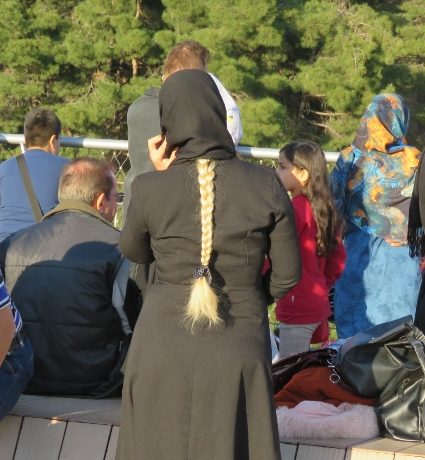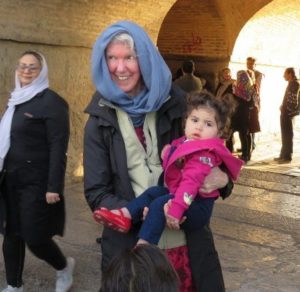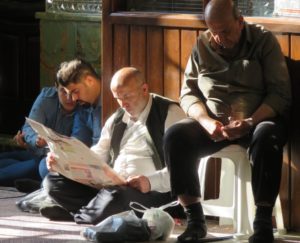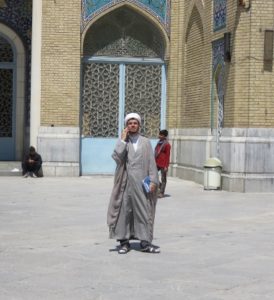
12 Jan Iran — Rock Stars from the Great Satan
Walking along the street in Iran, if you’re from the Great Satan, is like starring in your own triumphal procession, you attract so much goodwill.
We were there last spring and it’s the oddest feeling, nothing like what you expect, especially not to those of us whose strongest images of Iranians involve scary-looking mobs chanting “Death to America.” People come up to you, not by ones and twos, but by the scores and hundreds and snap selfies. Some thrust babies in your arms.

Mugging for the camera while her parents snap pictures
Entire high school classes surround you and say how much they like Americans. If you happen by a picnic, and picnics are everywhere, whole families will wave you over to join them. If it’s close to a mealtime, and it’s always close to a mealtime, strangers will invite you into their homes to eat.
Sometimes Iranians will elaborate a bit and tell you that, although they really do like Americans, they’re not so fond of our government . . . which struck me as profoundly sensible since it’s exactly how I feel. Every now and then I’d wax geopolitical and opine that, all over the world . . . Canada, South Africa, India, you name it . . . nobody likes their own government. To which they’d reply, “Yes, but we don’t like our government a lot more than they don’t like theirs.”
It’s hard to figure where all this good feeling toward Americans comes from. Back in the day, a lot of Iranians studied in the US and plenty of them must have brought home warm memories of their time in our country. Part, I suspect, has to do with the fact that they don’t see that many of us anymore. I have this theory that there’s an inverse relationship between how well-liked Americans are in any given place and the number of us who travel to that place. Some of why they like us may spring from the very public alternative we provide to the society Iranians are forced to live in. Whatever, two or three even told me they liked President Trump because, “His sanctions force our government to pay attention to the people.”
For a government trying its damndest to turn the Islamic Republic into a police state, the mullahs aren’t getting a lot of buy-in at the interpersonal level, at least when the other person is a foreigner. Iranians will tell you straight out, “We like talking to foreigners because we can discuss politics with you.” The unspoken . . . and, sometimes, spoken . . . corollary is that they’re afraid to talk politics with their own countrymen, at least if they don’t know that countryman well enough to share a drink with. In a society where the strictures of Islam are jammed down everybody’s throats, sharing a drink with a friend is the ultimate act of trust. In fact, drinking itself is an act of trust. With the borders shut tight and the vineyards at Shiraz long since uprooted, most of the available alcohol is homebrewed from raisins.
Public defiance happens in small ways, but small rebellions are the hardest to quell. Women . . . every woman, foreigner and local alike, even female SCUBA divers . . . are forced to hide themselves under layers of cloth. But there’s not enough cloth in the world to stop a pretty girl from letting you know. Femininity leaks out at every seam.

It’s hard to figure what a mullah could do about this.
Some of that cloth can be astonishingly form-fitting and the head coverings that go with the cloth can be shoved so far back on the head they become more of a tease, like a very low-cut gown in the West, than anything exemplifying feminine modesty.
Once, in a mosque of all places, Peggy saw a woman remove hers entirely. It was early morning and she stood in the light streaming through a curtainwall of stained glass, the colors dancing off her face and clothes, to have her picture taken. Then pulled off her scarf so her hair could be in the picture, too. A guard, who’d been posted in the shadows to protect against just such an outrage marched over and ordered her to cover back up. “Now.”
With the time-honored gesture imperious women all over the world use to dismiss bothersome males, she flicked her fingers at him, he retreated to the dark recesses he’d risen up from of, and she went back to the serious business of having her picture taken.
Over on the men’s side, attitudes seemed just as relaxed.

Kicking back in the Fatah Musemeh Shrine in Qom, one of Iran’s holiest cities and the hometown of Ayatollah Komeini
Iranians have rebelled in more substantial ways, too. After the Islamic Revolution when a particularly crazed mullah ordered that Persepolis be bulldozed, locals lay down in front of the Gate of All Nations, the gorgeous bas reliefs, and the remnants of Darius’s palace and treasury, and stayed laid down until the mullah gave up and the bulldozers lumbered away.
Nowadays the government tries to keep a lid on things by curtailing access to the internet. Email still works, but you can’t click through to content. If you subscribe to the New York Times, you can read the headlines because the headlines appear in the body of the emails, you just can’t get to the articles. None of the interpersonal apps work so, not only can’t you use Twitter or Facebook, you can’t even play Words with Friends, because Words with Friends lets you send messages to whomever you’re playing with. But when I say “you can’t,” I mean you can’t. I couldn’t. Peggy couldn’t. But we’re not citizens of the Islamic Republic. Actual Iranians download bootleg VPN’s and follow people on Facebook and read articles in foreign papers and play Words with Friends and, sometimes, send those friends subversive messages in Farsi.

Not everybody speaks to God, not even in the courtyard of a mosque
The mullahs haven’t responded the way you’d expect. These are modern, with-it mullahs who’ve evolved with the times. Sayyid Ali Hosseini Khamenei, the eighty-year-old head mullah and Supreme Leader of Iran, now has his own Facebook page and ministers to his flock over their illicit VPN’s.


No Comments